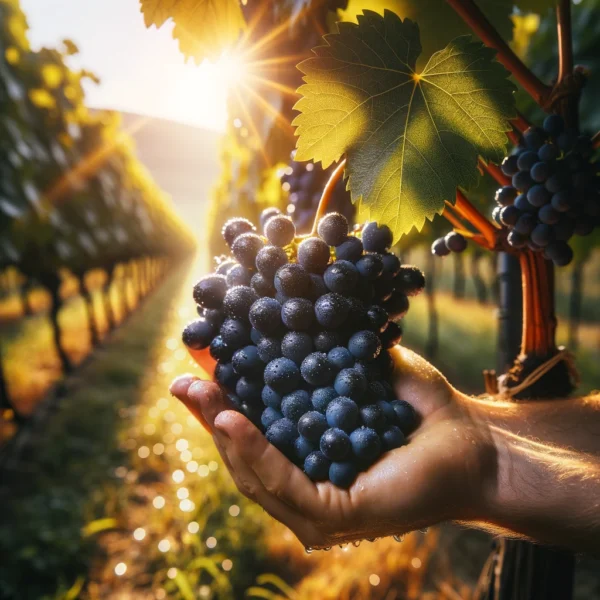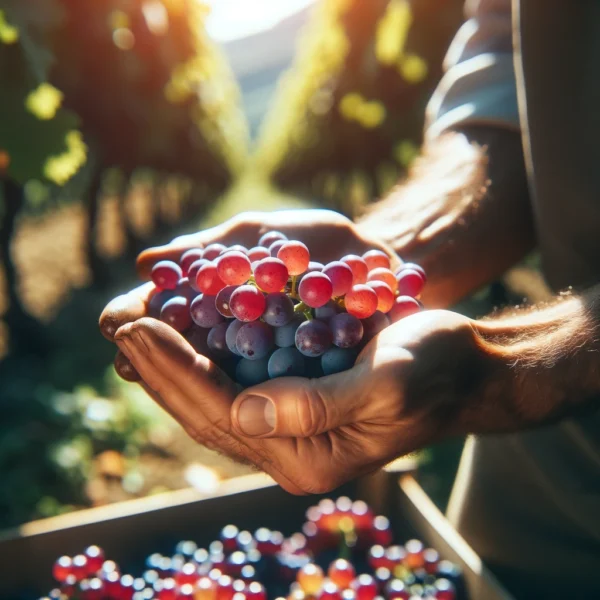
At first blush, the term “vegan wine” might seem redundant.
Wine, after all, is made from grapes, and what could be more plant-based than that?
However, the journey from vine to glass is more complex than it appears, involving processes that often employ animal-based products.
This revelation comes as a surprise to many, turning the quest for truly vegan wine into a discerning pursuit.
What is Vegan Wine?
Vegan wine means that the wine is produced without using any animal-derived products at any stage of the winemaking process.
While it may seem surprising, many wines are not inherently vegan or even vegetarian due to the use of animal-based substances in the fining process, which is used to clarify the wine.
Traditional fining agents include gelatin (from animals), casein (a milk protein), albumin (egg whites), and isinglass (fish bladder).
These agents help remove particles that can make the wine hazy, but they also prevent the wine from being considered vegan.
Vegan wines, on the other hand, utilize alternative fining agents or processes that do not involve animal products.
These can include bentonite clay, pea protein, or simply allowing the wine to naturally settle over time.
The goal is to produce wine that maintains its clarity and quality while being suitable for consumption by vegans, who avoid animal products for ethical, environmental, or health reasons.

Why Vegan Wine?
Choosing vegan wine aligns with a lifestyle that seeks to minimize animal exploitation and environmental impact.
It’s not just about what we eat but extends to what we drink.
This choice reflects a broader commitment to a more sustainable and ethical world.
Moreover, for some, it’s about purity and taste, believing that vegan winemaking allows the natural qualities of the wine to shine through, untainted by external additives.
How to Identify Vegan Wine
Label reading becomes an essential skill in the hunt for vegan wine.
Unlike food, many wine labels don’t clearly state whether the product is vegan, making it a bit of a detective game.
However, a growing number of winemakers are beginning to label their wines as vegan-friendly, recognizing the importance of transparency for consumers.
Look for certifications or specific mentions of “vegan” on the label.
Additionally, various online directories and apps dedicated to vegan products can be invaluable resources in your search.
Many vegan wines now feature special labels or certifications on the bottle to indicate that they are vegan-friendly.
These labels are designed to help consumers quickly identify wines that meet vegan standards, meaning no animal-derived products were used in the winemaking process.
However, the presence and style of vegan labeling can vary widely depending on the winery, the country of origin, and the specific certification bodies involved.
Here are a few key points about vegan labeling on wine bottles:
Vegan Logo or Statement: Some wine bottles will have a specific logo or a statement indicating that the wine is vegan.
This might be as straightforward as the word “Vegan” or a small logo depicting a plant, a leaf, or a V symbol designed to represent vegan products.
Certification Marks: There are various certification organizations around the world that certify vegan products, including wines.
If a wine has been certified by one of these organizations, it may carry their specific vegan certification mark on the label.
Organic and Biodynamic Certifications: While not all organic or biodynamic wines are vegan, these types of wines are more likely to be vegan than conventional wines, as they adhere to more natural winemaking processes.
Some consumers look for these certifications as an initial indicator, though further verification is needed to confirm the wine is truly vegan.
Lack of Uniformity: There is no global standard for vegan labeling on wine, so the appearance and information provided can vary.
In some countries, labeling regulations are stricter, which may influence how vegan wines are identified.
Additional Resources: Due to the lack of uniformity in labeling, many consumers rely on additional resources, such as vegan wine lists, apps, or websites dedicated to vegan products, to find information on vegan wines.
If you’re unsure whether a wine is vegan, the best approach is to research the specific wine or winery or contact the winery directly.
Many winemakers are increasingly transparent about their practices and happy to provide information to interested consumers.
The Winemaking Process: Vegan Alternatives
The crux of the matter lies in the fining process, where winemakers traditionally use animal-derived products like gelatin (from animals), isinglass (fish bladder), or egg whites to clarify wine.
These agents help remove proteins, yeast, and other organic particles.
The good news is that there are several vegan-friendly alternatives, including bentonite clay, pea protein, and activated charcoal, which effectively serve the same purpose without the ethical quandary.

Popular Vegan Wines and Wineries
Many wineries now offer vegan wines, with options spanning from affordable to premium.
Whether you’re in the mood for a robust red, a crisp white, or a sparkling rosé, there’s a vegan wine out there for you.
Brands like Bellissima Prosecco, Cooper’s Hawk, and Frey Vineyards are leading the charge, showcasing that quality and compassion can go hand in hand.
Here’s a curated table featuring a selection of great vegan wines, along with their approximate prices, tasting notes, and the countries or regions they hail from.
This selection aims to showcase the diversity and richness of vegan wines available in the market, providing options for various palates and preferences.
| Wine Name | Price Range | Tasting Notes | Country/Region |
|---|---|---|---|
| Bellissima Prosecco Brut
| $20 – $25 | Crisp, fresh, with aromas of apple and peach, and a hint of floral. | Italy, Veneto |
| Domaine Bousquet Malbec
| $15 – $20 | Rich and full-bodied with notes of dark fruit, chocolate, and a touch of vanilla. | Argentina, Mendoza |
| Frey Vineyards Organic Pinot Noir
| $20 – $25 | Light and smooth, featuring cherry and strawberry notes with a subtle earthiness. | USA, California |
| Cooper’s Hawk Blanc de Blanc
| $25 – $30 | Bright and zesty, offering citrus and green apple notes, with a creamy finish. | USA, Illinois |
| Stellar Organics Merlot
| $10 – $15 | Medium-bodied with plum and berry flavors, complemented by a soft, velvety finish. | South Africa, Western Cape |
| Yalumba Organic Viognier
| $15 – $20 | Aromatic and floral, with lush flavors of peach, apricot, and hints of ginger. | Australia, South Australia |
| Château Le Puy Emilien
| $30 – $35 | Complex and elegant, with layers of red fruits, spice, and a balanced tannic structure. | France, Bordeaux |
| Torres Natureo De-alcoholized Muscat
| $10 – $15 | Fragrant and fruity, with peach and citrus notes, offering a sweet yet refreshing taste. | Spain, Catalonia |
Please note that prices can vary based on location, taxes, and the retailer.
Also, wine vintages can affect tasting notes and availability, so it’s always a good idea to explore the most recent reviews and releases for the most accurate information.
This table offers a glimpse into the variety of vegan wines available, from sparkling and white to red and even de-alcoholized options, showcasing the global movement towards more inclusive and ethical winemaking practices.
Whether you’re in the mood for a celebratory bubbly, a cozy red, or a refreshing white, there’s a vegan wine out there that’s perfect for the occasion.
Pairing Vegan Wine with Food
The art of pairing wine with food is a delightful exploration of flavors and textures, and vegan wine is no exception.
This practice transcends merely matching a drink with a meal; it’s about creating a harmonious dining experience that enhances the enjoyment of both the wine and the food.
Vegan wine, with its diverse range and ethical production, offers a unique canvas for culinary creativity.
Imagine a glass of full-bodied vegan Cabernet Sauvignon paired with a rich, mushroom-based risotto.
The deep, robust flavors of the wine complement the earthy tones of the mushrooms, while its structured tannins cut through the creaminess of the risotto, creating a balanced and immersive taste experience.
Each sip reveals layers of complexity, with dark fruit notes and a hint of spice from the wine, enhancing the savory umami of the dish.
Alternatively, consider a light and lively vegan Pinot Grigio alongside a citrusy, avocado salad.
The crisp acidity and fresh, floral aromas of the Pinot Grigio contrast beautifully with the creamy texture of the avocado, while the citrus dressing echoes the wine’s zesty character.
This pairing is a testament to the versatility of vegan wines, demonstrating how a well-chosen white can uplift a simple salad to a refreshing and sophisticated ensemble.
The possibilities are indeed endless when it comes to vegan wine and food pairings.
From the hearty and decadent to the light and refreshing, there’s a vegan wine to match every dish.
For example, a spicy, aromatic vegan Gewürztraminer can be the perfect companion to a Thai green curry, with the wine’s lychee and rose petal notes complementing the dish’s complex spices and coconut milk richness.
Meanwhile, a vegan sparkling wine, such as a Prosecco or Champagne, can add a celebratory touch to any meal, its bubbles and bright acidity making it an excellent match for salty or fried appetizers, enhancing both the texture and the flavors.
Beyond the specific pairings, the act of choosing vegan wine also speaks to a broader appreciation for sustainable and ethical consumption.
Selecting vegan wines ensures that your dining experience is not only delicious but also aligned with values of environmental stewardship and animal welfare.
This mindful approach to dining adds an additional layer of satisfaction, knowing that your choices contribute to a more compassionate and sustainable world.
In essence, the right pairing can indeed elevate both the dish and the wine to new heights, creating a dining experience that is greater than the sum of its parts.
Whether you’re a seasoned wine connoisseur or a curious foodie, exploring the world of vegan wine and food pairings opens up a universe of flavors, textures, and aromas, waiting to be discovered and savored.

DIY Vegan Wine Tasting at Home
Why not bring the vineyard to your living room with a DIY vegan wine tasting?
Gather a selection of vegan wines, prepare a variety of plant-based nibbles, and invite your friends over for a night of discovery.
Provide each guest with a tasting sheet to jot down their impressions, making it a fun and interactive way to deepen your appreciation for vegan wines.
The AROMA WHEEL can be quite in handy!
Where to Find Vegan Wine?
Finding vegan wine has become easier as demand for vegan and plant-based products grows.
Here are some tips on where to find vegan wine:
Specialty Wine Stores: Many specialty wine retailers are knowledgeable about vegan wines and may curate a selection specifically labeled as vegan.
Don’t hesitate to ask the staff for recommendations.
Online Retailers: There are several online wine shops and marketplaces dedicated to vegan, organic, and biodynamic wines.
These platforms often provide detailed descriptions and filters to help you find vegan wines easily.
Winery Websites: If you have a favorite winery, check their website.
Many wineries provide detailed information about their winemaking processes and indicate whether their wines are vegan.
Vegan Wine Clubs: Subscription services and wine clubs focusing on vegan wines are a convenient way to explore a variety of vegan options.
These clubs often offer a curated selection of wines delivered to your door.
Vegan and Organic Wine Certifications: Look for certifications or labels on the wine bottle that indicate the wine is vegan or made with organic practices, as these often align with vegan principles.
However, not all vegan wines are certified, so this isn’t the only indicator.
Natural Wine Sellers: Natural wines are made with minimal intervention in the winemaking process and often without animal-derived fining agents.
While not all natural wines are vegan, many natural wine sellers offer a good selection of vegan options.
Wine Apps and Websites: Use wine apps and websites that feature vegan wine listings and reviews.
These can be great resources for discovering new vegan wines and learning about their availability in your area.
When in doubt, contacting the winery directly to ask about their winemaking process is a reliable way to ensure the wine is vegan.
As the interest in vegan wine continues to grow, more wineries are becoming transparent about their practices, making it easier for consumers to make informed choices.
Conclusion: The Future of Vegan Wine
As the demand for vegan products continues to rise, the wine industry is taking note.
Vegan wine is moving from niche to norm, with an ever-expanding selection that promises to cater to all palates and preferences.
This evolution speaks to a broader shift towards more conscious consumption, where every sip supports a more ethical and sustainable world.
Embark on your vegan wine journey today and join a growing community of ethically-minded wine lovers.
Share your discoveries, recommendations, and experiences with others, and let’s raise a glass to the delicious diversity of vegan wine.
Whether you’re a seasoned vegan or simply exploring, the world of vegan wine is ripe for discovery, full of flavors waiting to be savored in good conscience.
And while you are sipping on that wine, think about all the histamines and sulfites. Vegan doesn’t always mean no histamines and no sulfites. Check out this filter!
FAQs:
Q1: What makes a wine vegan?
A1: A wine is considered vegan if its production process does not use any animal-derived products.
While the wine itself is made from grapes, certain stages of winemaking, particularly the fining process, often utilize animal products like gelatin or isinglass.
Vegan wines use alternative fining agents, such as bentonite clay or activated charcoal.
Q2: How can I tell if a wine is vegan?
A2: The best way to determine if a wine is vegan is to look for vegan labeling on the bottle.
However, not all vegan wines are labeled as such.
You can also check the winery’s website, contact the winery directly, or use online resources and apps dedicated to vegan products.
Q3: Are vegan wines more expensive than non-vegan wines?
A3: Not necessarily. The price of wine is influenced by a variety of factors, including production methods, quality of grapes, and brand reputation.
Vegan wines come in a range of prices, from budget-friendly to premium, just like non-vegan wines.
Q4: Do vegan wines taste different from non-vegan wines?
A4: Vegan wines aim to maintain the natural flavors of the grapes and terroir, just like any good wine should.
The difference lies in the fining process, not the taste.
Many wine enthusiasts find that vegan wines offer a pure expression of the wine’s character, but the taste difference is subjective and often indiscernible.
Q5: Why aren’t all wines vegan?
A5: Traditionally, winemakers have used animal-derived products in the fining process to clarify wine, as these agents are effective at removing impurities.
However, with advancements in winemaking technology and a growing demand for vegan products, more winemakers are adopting animal-free alternatives.
Q6: Can I still enjoy a wide variety of wines if I choose vegan?
A6: Absolutely! The variety of vegan wines available is continually expanding.
From robust reds and crisp whites to sparkling and rosé wines, there’s a vegan option for almost every type of wine lover.
Q7: Where can I buy vegan wine?
A7: Vegan wines can be found in many places where wine is sold, including liquor stores, supermarkets, and online retailers.
Look for vegan labeling or consult the retailer’s staff. There are also specialty online stores dedicated to vegan wines.
Q8: Are there vegan wines at restaurants?
A8: Yes, more restaurants are starting to offer vegan wines as part of their wine lists, especially those that cater to vegan or health-conscious diners.
It’s always a good idea to ask your server for vegan wine options.
Q9: How can I serve vegan wine?
A9: Serve vegan wine just as you would any other wine, paying attention to the recommended serving temperatures to best express the wine’s flavors.
Vegan wines pair wonderfully with a wide range of foods, including plant-based dishes.
Q10: Is the interest in vegan wine a trend or here to stay?
A10: The interest in vegan wine is part of a broader shift towards more ethical and sustainable consumption practices.
As awareness grows and demand increases, vegan wine is becoming a staple choice for many wine lovers, suggesting it’s here to stay.







